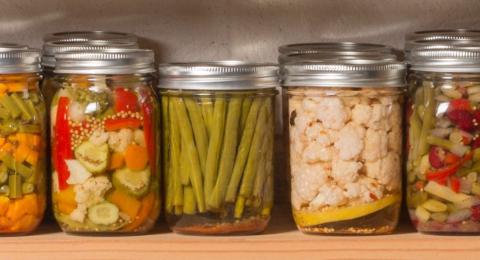If lids are tightly vacuum sealed on cooled jars, remove ring bands, wash the lid and jar to remove food residue without disturbing the sealed lid; then rinse and dry jars. Food residues can support the growth of molds (which are airborne) outside the jar during storage. Wash and dry ring bands to protect them from corrosion for future use. It is recommended that jars be stored without ring bands to keep them dry as well as to allow for easier detection of any broken vacuum seals. However, if you choose to re-apply the ring bands, make sure all surfaces are clean and thoroughly dry first. Moisture under the ring bands can cause the lids to rust, which can affect the integrity of the seal.
If jars are stacked in storage, be careful not to disturb vacuum seals. The recommendation is to stack no more than 2 layers of jars on top of one another. It would be best to provide support between the layers as a preventive measure against disturbing the seals on the lower jars. Jars could be placed in boxes to be stacked or use some type of firm solid material across the jars as a supportive layer in between them.
Label and date the jars and store them in a clean, cool, dark, dry place. Labeling and dating allows you to know if a certain batch of jars become unsealed. This is also a guide for which jars to use first. For best quality, store jars of food between 50°F and 70°F. Also, for best quality, can no more food than you will use within a year unless directions for a specific food provide other advice.
Do not store jars above 95° F or near hot pipes, a range, a furnace, in an uninsulated attic, or in direct sunlight. Under these conditions, food will lose quality in a few weeks or months and may spoil. Dampness may corrode metal lids, break seals, and allow contamination and spoilage.
Accidental freezing of canned foods will not cause spoilage unless jars become unsealed and contaminated. However, freezing and thawing may soften food. If jars must be stored where they may freeze, wrap them in newspapers, place them in heavy cartons, and cover them with more newspapers and blankets.

